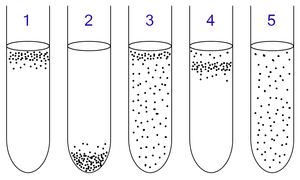
1: Obligate aerobes need oxygen because they cannot ferment or respire anaerobically. They gather at the top of the tube where the oxygen concentration is highest.
2: Obligate anaerobes are poisoned by oxygen, so they gather at the bottom of the tube where the oxygen concentration is lowest.
3: Facultative anaerobes can grow with or without oxygen because they can metabolise energy aerobically or anaerobically. They gather mostly at the top because aerobic respiration generates more ATP than either fermentation or anaerobic respiration.
4: Microaerophiles need oxygen because they cannot ferment or respire anaerobically. However, they are poisoned by high concentrations of oxygen. They gather in the upper part of the test tube but not the very top.
5: Aerotolerant organisms do not require oxygen as they metabolise energy anaerobically. Unlike obligate anaerobes however, they are not poisoned by oxygen. They can be found evenly spread throughout the test tube.
An aerobic organism or aerobe is an organism that can survive and grow in an oxygenated environment.[1] The ability to exhibit aerobic respiration may yield benefits to the aerobic organism, as aerobic respiration yields more energy than anaerobic respiration.[2] Energy production of the cell involves the synthesis of ATP by an enzyme called ATP synthase. In aerobic respiration, ATP synthase is coupled with an electron transport chain in which oxygen acts as a terminal electron acceptor.[3] In July 2020, marine biologists reported that aerobic microorganisms (mainly), in "quasi-suspended animation", were found in organically poor sediments, up to 101.5 million years old, 250 feet below the seafloor in the South Pacific Gyre (SPG) ("the deadest spot in the ocean"), and could be the longest-living life forms ever found.[4][5]
- ^ "aerobe" at Dorland's Medical Dictionary
- ^ Kroneck PM, Sosa Torres ME, eds. (2021). Metals, Microbes, and Minerals - The Biogeochemical Side of Life (1st ed.). Berlin: de Gruyter GmbH & Co. KG. ISBN 978-3-11-058890-3. OCLC 1201187551.
- ^ Morelli AM, Ravera S, Panfoli I (October 2020). "The aerobic mitochondrial ATP synthesis from a comprehensive point of view". Open Biology. 10 (10): 200224. doi:10.1098/rsob.200224. PMC 7653358. PMID 33081639.
- ^ Wu KJ (28 July 2020). "These Microbes May Have Survived 100 Million Years Beneath the Seafloor - Rescued from their cold, cramped and nutrient-poor homes, the bacteria awoke in the lab and grew". The New York Times. Retrieved 31 July 2020.
- ^ Morono Y, Ito M, Hoshino T, Terada T, Hori T, Ikehara M, et al. (July 2020). "Aerobic microbial life persists in oxic marine sediment as old as 101.5 million years". Nature Communications. 11 (1): 3626. Bibcode:2020NatCo..11.3626M. doi:10.1038/s41467-020-17330-1. PMC 7387439. PMID 32724059.